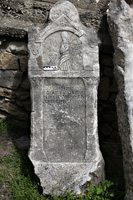 MAMA XI 203 (Axylon)
MAMA XI 203 (Axylon) 
Funerary stele for Io and Io
- Type of monument:
- Funerary stele.
- Location:
- Çeşmelisebil (Axylon): not recorded.
- Description:
- Limestone stele, complete; to left and right, pilasters with stylised capitals; at top, arched aedicula within vaulted pediment. At top of pediment, star in relief. In the aedicula, standing veiled female figure in relief. To her left, incised spindle, distaff and basket; to her right, incised bureau supporting mirror. On the left pilaster of the aedicula, stylised door-knocker.
- Dimensions:
- Ht. 1.40; W. 0.52 (top), 0.48 (shaft); Th. 0.25; letters 0.017-0.025.
- Record:
- WMC notebook copy (1954/46); photograph (CVC).
- Publication:
- None.
- Date:
- Roman imperial period.
Μανης Ιωδι τῇ
ἰδίᾳ γυναικὶ καὶ
Ιῳ τῇ ἰδίᾳ θυγα-
τρὶ μνήμης χά-
5 vac. ριν.
Manes for Io, his own wife, and for Io, his own daughter, in memoriam.




The female name Ιω is attested in the Axylon at Kelhasan (MAMA VII 499; Waelkens 1986: 247-8, no. 639: Α[ἰ]λήα Ιω), at Zengen [Özkent] (MAMA XI 212 (1954/71): ἰδίᾳ Ιῳ γυναικί) and perhaps at Azak [Hodoğlu] (MAMA XI 209 (1954/73): Ιωδηνᾳ μητρί). At MAMA VII 499, Calder accents the name as though it were the Greek name Ἰώ. However, the indigenous male name Ιωδας/Ιωδης is common in precisely this same region (Zgusta 1964: 206 §496), being attested at Sarıkaya (MAMA VII 379: Αὐρ. Ιωδης), probably Yaraşlı (MAMA XI 236 [1957/14]: Αὐρήλυος Υωδης), Kerpiç (RECAM II 373: Μουνᾳ Ιω[δ]εως), Atkafası (Waelkens 1986: 242-3, no. 623: Ιωδῃ πατρί), and Yukarıçiğil, in the highlands south of Ilgın (Anderson 1898: 120, no. 65: Παπᾳ Μανου Ιωδα). I should prefer to treat the name Ιω in this region as indigenous also.
I presume that Ιωδι in line 1 and Ιῳ in line 3 are different forms of the dative for a single indigenous name Ιω. For this kind of variation, cf. MAMA VII 63 (Laodikeia: Kındıras), Ιωναδι μητρί and MAMA I 120 (Laodikeia: Kadınhanı), θυγατρὶ Ιωνᾳ, where in both cases I would assume that we are dealing with an indigenous female name Ιωνα.
The monument was still visible behind the Belediye at Çeşmelisebil in April 2011.